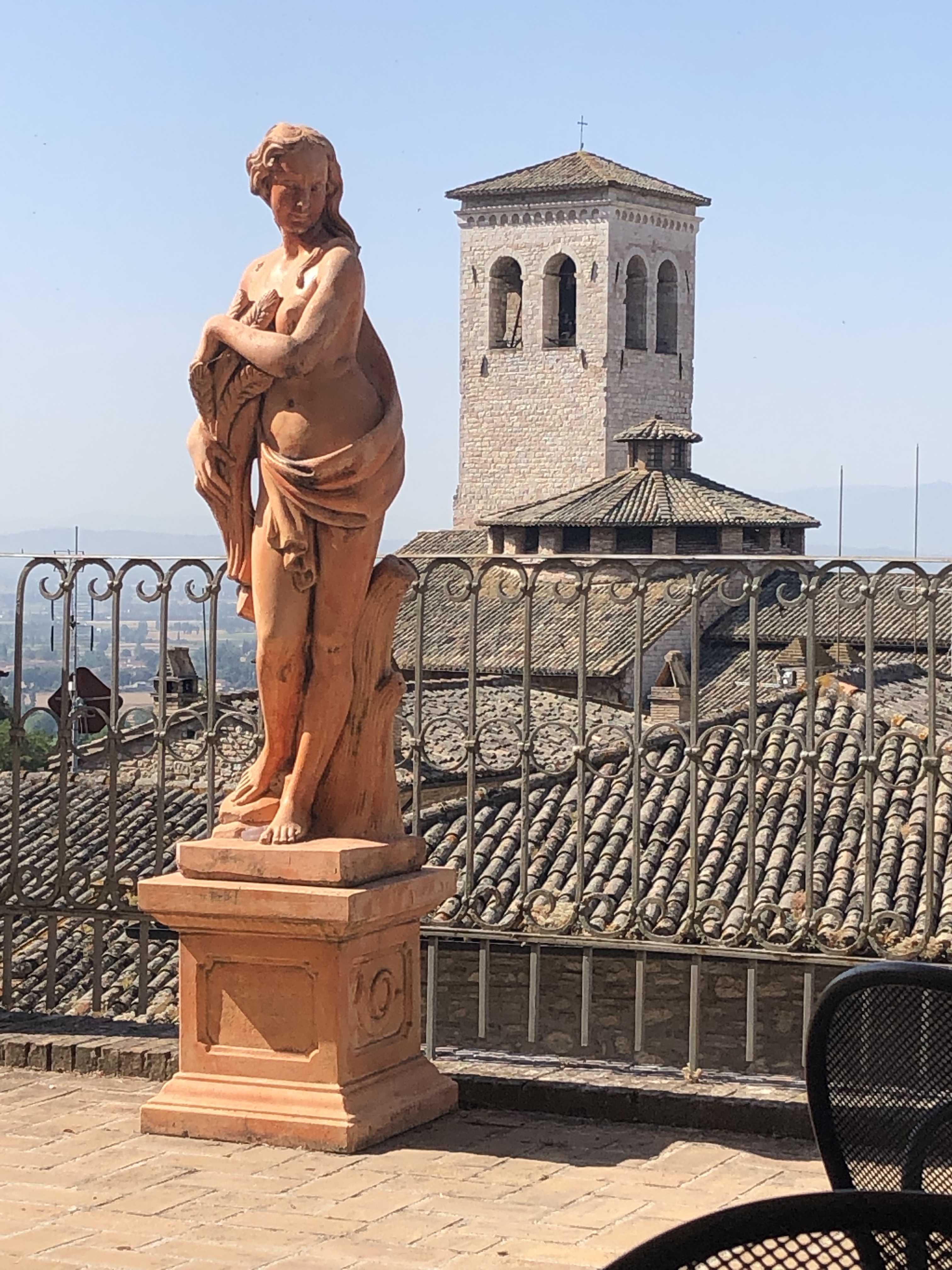The photograph illustrating this blog post was snapped from the terrace of our hotel in Assisi, and made me think about the contrast between all the sensual and lush pleasures of life and the austerity of the faith.
A pilgrimage to Assisi hammers home the clash in the church and the world between rags and riches–pleasure and poverty. A few days ago we were in Rome contemplating the splendor of Baroque churches and the wealth, power and prestige of Christ’s One, Holy, Catholic and Apostolic Church. Today we are in the city of Il Poverello–God’s little poor fool Francis.
Earlier this week we were in Norcia where the monks are emulating our Holy Father Benedict in establishing a simple monastery in the hills…living out their vows of stability, obedience and conversion of life. Today we are in Assisi where Francis stood naked before God and man and gave up everything to build something beautiful for God. Before we leave today we’ll pay a visit to San Damiano where one really catches the spirit of Francis and his poor reform.
It is all too easy to see the splendor and react with alarm or even disgust. “Jesus was born in a stable! He had no place to lay his head! What is all this gold? What are these jewels? What have these palaces to do with the poor man of Galilee?
It is all too easy therefore to fall completely for the charm of St Francis. “He understood! He got it! He knew the true riches of the church were the poor, The true riches of God were the birds, the sun, the moon, the beauties of creation, the little children and all the simple things of life–the things that are free are the greatest riches!”
This is indeed not only enchanting but true, but it would be wrong to conclude that the Franciscan way is the whole gospel. If there are traps in following the way of wealth and splendor, there are also traps in the way of poverty and asceticism. The traps in the way of rags are more subtle than the traps in the way of riches.
Most people are attracted to St Francis for a few romantic moments while never dreaming of adopting a simpler lifestyle themselves. Those who do follow the Franciscan way are also liable to self righteousness, hypocrisy and judging others. There can also be a deceptive vanity at the heart of the way of St Francis. It is possible to be proud of one’s poverty and to become fussy in the pursuit of austerity.
“Oh no. Really. I couldn’t possibly have a cooked breakfast! Just the driest piece of toast with perhaps a light spread of organic cream cheese for me. You don’t have organic? Never mind. I’ll settle for this handful of raisins. But do you have any tea? I prefer Indian tea…” You get the idea.
This is why, although I love and value St Francis, I think St Benedict has the edge.
Benedict understood the need for simplicity. His rule does not allow the monks to own personal property. The community can own stuff, but the monk does not. This allows for proper detachment from material riches, while allowing the community to prosper, do its work, minister to the poor, educate the young and help the needy.
The Benedictine way also allows for the beauty of man’s creation to flourish. The arts, music, architecture and learning can all blossom in the breadth and balance of the Benedictine Way. If Francis is right, then God has given us all good things to enjoy. We should enjoy all the riches of the natural world, but we can also enjoy all the gifts created by our fellow man for we too are sub creators made in the image of God. Any asceticism that denies the goodness of the created order and the goodness of the man-created order should be rejected as sub Christian.
How do we learn to love the abundance of all created things–including the man created things–in proper balance? A thought from Thomas Traherne has always inspired me. He wrote, “Can a man be just unless he love all things according to their worth?”
So we first assess the thing’s worth and we love that thing according to its worth. Is this dish useful for eating? Then I love it as a piece of crockery. Is it fine china, beautifully crafted, rare and precious? Then I love it for its beauty, rarity and craftsmanship, but I do NOT love it because it might fetch $40,000 at auction. Is this motorcar a thing of beauty, efficiency, safety and comfort in travel? I love it for its worth, but I do NOT love it because it is more swish and expensive than my neighbor’s.
This is the balance the Benedictine way offers. Not the extreme way of Francis which can veer too close to a negative and Manichean asceticism, but the way of balance between rags and riches–a way in which we strive to love all things for their worth and according to the degree in which they reflect the glory of God







It’s all about balance and true value. Whether it is St. Francis and St. Benedict or Pope Benedict XVI and Pope Francis, they are two sides of the same coin. What gives value to both sides is not possessing or rejecting a precious metal but having our one Lord Jesus Christ and his precious blood alive in us.